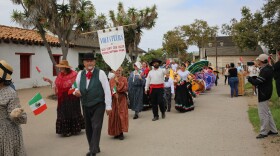STEVE INSKEEP, host:
It's MORNING EDITION from NPR News. I'm Steve Inskeep
LYNN NEARY, host:
And I'm Lynn Neary.
President Bush has a meeting today that raises questions about what he's called his freedom agenda. He's hosting the long-time ruler of Kazakhstan, an oil-rich former Soviet Republic.
Kazakhstan's president has been accused of rigging elections, keeping a tight lid on the media and even of taking bribes.
NPR's Michele Kelemen reports.
MICHELE KELEMEN: White House officials seemed to go out of their way to ensure less media coverage, calling off interviews with U.S. officials involved in the visit, but the Kazakh embassy pulled out all the stops yesterday.
(Soundbite of music)
KELEMEN: With the national anthem blasting outside the embassy, not far from the White House, Kazakh President Nursultan Nazarbayev seemed to relish the attention to his country. He unveiled a bronze statue of a young warrior on a winged snow leopard, a statue meant to show Kazakhstan's leap to the future.
President NURSULTAN NAZARBAYEV (Kazakhstan): (Through translator) Even with him being a warrior, this man represents a peaceful nation. We were the country which renounced nuclear weapons and got rid of its nuclear arsenal, and we have established close cooperation with the United States in the nonproliferation nuclear disarmament area, in energy, trade, economy and democratization of society.
KELEMEN: The author of the book Kazakhstan: Unfulfilled Promise, Martha Brill Olcott, says Nazarbayev gets a lot out of a trip like this.
Ms. MARTHA BRILL OLCOTT (Author): He gets a lot of photographs for Kazakh TV. And I'm not sarcastic about that. He gets the opportunity to show the Kazakh people and the people in neighboring countries that he is a welcome guest in the White House, that he's gotten the best luncheon invitation available in the free world. That's status.
KELEMEN: This is not the Kazakh leader's first trip to the Bush White House. He was here in 2001, and he also made some private visits in recent years. But Olcott, who's with the Carnegie Endowment, says he wasn't getting the official invitations he wanted until now.
Ms. OLCOTT: He hadn't been an official visitor in the U.S. because of Kazakh-gate, the corruption trials in New York.
KELEMEN: In a case that is yet to go to trial, American James Giffen is accused of bribing two Kazakh officials, including Nazarbayev, to steer oil contracts to American companies. Nazarbayev portrays himself as a good energy partner for the U.S., and Olcott says she thinks his visit is in part a reward to Kazakhstan for joining the Baku-Ceyhan pipeline project, which bypasses Russia.
Ms. ALCOTT: They did finally agree to start shipping some oil and gas, starting after 2008, along this route. The administration would like them to go further than that and agree to build the undersea trans-Caspian gas pipeline.
KELEMEN: There were other big issues at stake. The U.S. needs partners in Central Asia, a strategic part of the world. U.S. officials say Nazarbayev is more democratic than most in that area. That's an argument that falls flat with the long-time human rights advocate, Republican Congressman Chris Smith of New Jersey.
Representative CHRIS SMITH (Republican, New Jersey): Well, that's not saying much, especially when you look at Uzbekistan and some of the other regional countries. I mean it's been several years since they've matriculated from communism to what should have been a democracy, and the fact that all roads lead to the president's chambers is very disconcerting. I mean he has so much power.
KELEMEN: Smith has been an outspoken opponent of Nazarbayev's bid to chair a European human rights body, the Organization for Security and Cooperation in Europe. And Smith said he'd like to see President Bush bring up some other very specific concerns, including the difficulties U.S. democracy promoters face in Kazakhstan.
Mr. SMITH: Friends don't let friends commit human rights abuses. Well, Kazakhstan is a country that we have in the friend column, but I think we have to be much more robust in pressing the issues of respect for fundamental human rights.
KELEMEN: A White House official says the president will raise these issues and sees this Oval Office meeting as a chance to move forward on the so-called freedom agenda.
Michele Kelemen, NPR News, Washington. Transcript provided by NPR, Copyright NPR.






